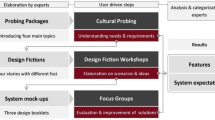Abstract
As the elder population continues to increase throughout the world, there is a tremendous need for technologies that will keep elders healthy and self-sufficient in their homes. Ubiquitous, smart home technologies can fulfill this role, but a thorough understanding of elders’ routines, lifestyles, and home environments is required in order to develop effective aids. This paper describes our research approach, which evolved from stories related in household interviews (‘tales’), ethnographic observation of elders’ routines and environments (‘tours’), analysis of artefacts (‘tools’) and finally interactive performances (‘troupes’) to convey and elicit feedback about the capabilities of future home technologies for the elderly. This combination of methods revealed a range of user values, behaviours, coping styles, and requirements for ubiquitous technology that would otherwise have been difficult to gather in this domain of ubiquitous, ‘invisible’ computing.
Access this chapter
Tax calculation will be finalised at checkout
Purchases are for personal use only
Preview
Unable to display preview. Download preview PDF.
Similar content being viewed by others
References
Burns, C, Dishman, E., Verplank, W. & Lassiter, B. [1994], Actors, Hairdos and Videotape: Informance Design, in B. Adelson, S. Dumais & J. Olson (eds.), Proceedings of the SIGCHI Conference on Human Factors in Computing Systems: Celebrating Interdependence (CHI’94), ACM Press, pp.119–20.
Gibson, M., Freiman, M., Gregory, S., Kassner, E., Kochera, A., Mullen, F., Pandya, S., Redfoot, D., Straight, A. & Wright, B. [2003], Beyond 50: A Report to the Nation on Independent Living and Disability, http://research.aarp.org/il/beyond_50_il.html.
Hirsch, T., Forlizzi, J., Hyder, E., Goetz, J., Strobeck, J. & Kurtz, C. [2000], The ELDer Project: Social, Emotional and Environmental Factors in the Design of Eldercare Technologies, in J. Thomas (ed.), Proceedings of the ACM Conference on Universal Usability (CUU 2000), ACM Press, pp.72–9.
Intille, S. S. [2002], Designing a Home of the Future, IEEE Pervasive Computing 1(2), 76–82.
Kidd, C. D., Orr, R. J., Abowd, G. D., Atkeson, C. G., Essa, I. A., MacIntyre, B., Mynatt, E., Starner, T. E. & Newstetter, W. [1999], The Aware Home: A Living Laboratory for Ubiquitous Computing Research, in N. A. Streitz, J. Siegel, V. Hartkopf & S. Konomi (eds.), Cooperative Buildings: Integrating Information, Organizations, and Architecture. Second International Workshop, CoBuild’99, Vol. 1670 of Lecture Notes in Computer Science, Springer-Verlag, pp. 191–8.
Marsh, J. [2002], House Calls, Rochester Review 64(3), 22–6.
MMWR [2003], Public Health and Aging: Trends in Aging — United States and Worldwide, Morbidity and Mortality Weekly Report 52(06), 101–6. Also avaialble at http://www.cdc.gov/mmwr/preview/rnmwrhtml/mm5206a2.htm.
Nielsen, J. [1993], Usability Engineering, Academic Press.
Norman, D. [2002], Emotion and Design: Attractive Things Work Better, Interactions 9(4), 36–42.
Salvador, T. & Howells, K. [1998], Focus Troupe: Using Drama to Create Common Context for New Product Concept End User Evaluations, in C.-M. Karat & A. Lund (eds.), CHI’98 Conference Summary of the Conference on Human Factors in Computing Systems, ACM Press, pp.251–2.
Sato, S. & Salvador, T. [1999], Playacting and Focus Troupes: Theatre Techniques for Creating Quick, Intense, Immersive and Engaging Focus Group Sessions, Interactions 6(5), 35–41.
Author information
Authors and Affiliations
Editor information
Editors and Affiliations
Rights and permissions
Copyright information
© 2005 Springer-Verlag London Limited
About this paper
Cite this paper
Lundell, J., Morris, M. (2005). Tales, Tours, Tools, and Troupes: A Tiered Research Method to Inform Ubiquitous Designs for the Elderly. In: Fincher, S., Markopoulos, P., Moore, D., Ruddle, R. (eds) People and Computers XVIII — Design for Life. Springer, London. https://doi.org/10.1007/1-84628-062-1_11
Download citation
DOI: https://doi.org/10.1007/1-84628-062-1_11
Publisher Name: Springer, London
Print ISBN: 978-1-85233-900-5
Online ISBN: 978-1-84628-062-7
eBook Packages: Computer ScienceComputer Science (R0)




